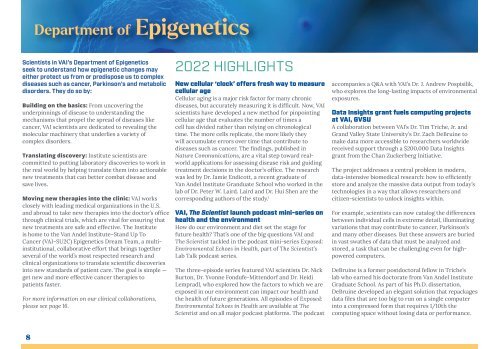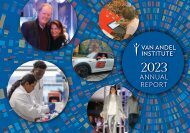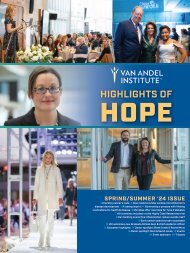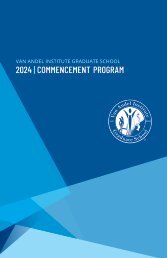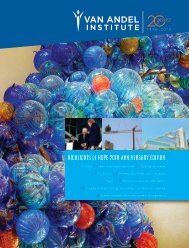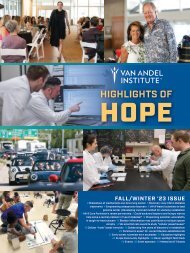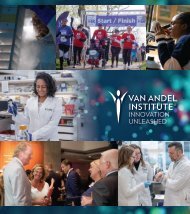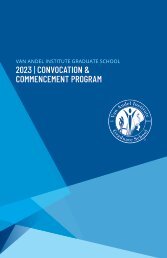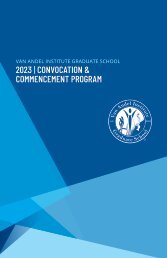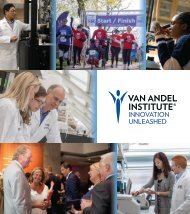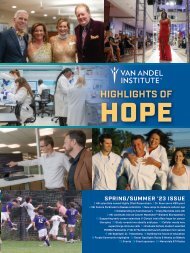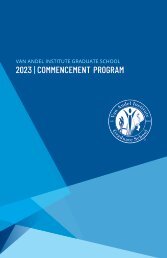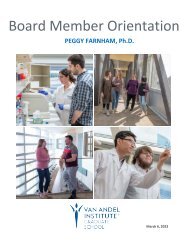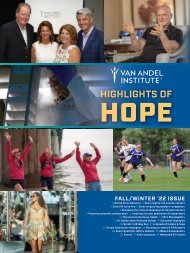2022 Annual Report
This is the 2022 Annual Report for Van Andel Institute.
This is the 2022 Annual Report for Van Andel Institute.
Create successful ePaper yourself
Turn your PDF publications into a flip-book with our unique Google optimized e-Paper software.
Department of Epigenetics<br />
Scientists in VAI’s Department of Epigenetics<br />
seek to understand how epigenetic changes may<br />
either protect us from or predispose us to complex<br />
diseases such as cancer, Parkinson’s and metabolic<br />
disorders. They do so by:<br />
Building on the basics: From uncovering the<br />
underpinnings of disease to understanding the<br />
mechanisms that propel the spread of diseases like<br />
cancer, VAI scientists are dedicated to revealing the<br />
molecular machinery that underlies a variety of<br />
complex disorders.<br />
Translating discovery: Institute scientists are<br />
committed to putting laboratory discoveries to work in<br />
the real world by helping translate them into actionable<br />
new treatments that can better combat disease and<br />
save lives.<br />
Moving new therapies into the clinic: VAI works<br />
closely with leading medical organizations in the U.S.<br />
and abroad to take new therapies into the doctor’s office<br />
through clinical trials, which are vital for ensuring that<br />
new treatments are safe and effective. The Institute<br />
is home to the Van Andel Institute–Stand Up To<br />
Cancer (VAI–SU2C) Epigenetics Dream Team, a multiinstitutional,<br />
collaborative effort that brings together<br />
several of the world’s most respected research and<br />
clinical organizations to translate scientific discoveries<br />
into new standards of patient care. The goal is simple —<br />
get new and more effective cancer therapies to<br />
patients faster.<br />
For more information on our clinical collaborations,<br />
please see page 16.<br />
<strong>2022</strong> HIGHLIGHTS<br />
New cellular ‘clock’ offers fresh way to measure<br />
cellular age<br />
Cellular aging is a major risk factor for many chronic<br />
diseases, but accurately measuring it is difficult. Now, VAI<br />
scientists have developed a new method for pinpointing<br />
cellular age that evaluates the number of times a<br />
cell has divided rather than relying on chronological<br />
time. The more cells replicate, the more likely they<br />
will accumulate errors over time that contribute to<br />
diseases such as cancer. The findings, published in<br />
Nature Communications, are a vital step toward realworld<br />
applications for assessing disease risk and guiding<br />
treatment decisions in the doctor’s office. The research<br />
was led by Dr. Jamie Endicott, a recent graduate of<br />
Van Andel Institute Granduate School who worked in the<br />
lab of Dr. Peter W. Laird. Laird and Dr. Hui Shen are the<br />
corresponding authors of the study. 1<br />
VAI, The Scientist launch podcast mini-series on<br />
health and the environment<br />
How do our environment and diet set the stage for<br />
future health? That’s one of the big questions VAI and<br />
The Scientist tackled in the podcast mini-series Exposed:<br />
Environmental Echoes in Health, part of The Scientist’s<br />
Lab Talk podcast series.<br />
The three-episode series featured VAI scientists Dr. Nick<br />
Burton, Dr. Yvonne Fondufe-Mittendorf and Dr. Heidi<br />
Lempradl, who explored how the factors to which we are<br />
exposed in our environment can impact our health and<br />
the health of future generations. All episodes of Exposed:<br />
Environmental Echoes in Health are available at The<br />
Scientist and on all major podcast platforms. The podcast<br />
accompanies a Q&A with VAI’s Dr. J. Andrew Pospisilik,<br />
who explores the long-lasting impacts of environmental<br />
exposures.<br />
Data Insights grant fuels computing projects<br />
at VAI, GVSU<br />
A collaboration between VAI’s Dr. Tim Triche, Jr. and<br />
Grand Valley State University’s Dr. Zach DeBruine to<br />
make data more accessible to researchers worldwide<br />
received support through a $200,000 Data Insights<br />
grant from the Chan Zuckerberg Initiative.<br />
The project addresses a central problem in modern,<br />
data-intensive biomedical research: how to efficiently<br />
store and analyze the massive data output from today’s<br />
technologies in a way that allows researchers and<br />
citizen-scientists to unlock insights within.<br />
For example, scientists can now catalog the differences<br />
between individual cells in extreme detail, illuminating<br />
variations that may contribute to cancer, Parkinson’s<br />
and many other diseases. But these answers are buried<br />
in vast swathes of data that must be analyzed and<br />
stored, a task that can be challenging even for highpowered<br />
computers.<br />
DeBruine is a former postdoctoral fellow in Triche’s<br />
lab who earned his doctorate from Van Andel Institute<br />
Graduate School. As part of his Ph.D. dissertation,<br />
DeBruine developed an elegant solution that repackages<br />
data files that are too big to run on a single computer<br />
into a compressed form that requires 1/10th the<br />
computing space without losing data or performance.<br />
8


